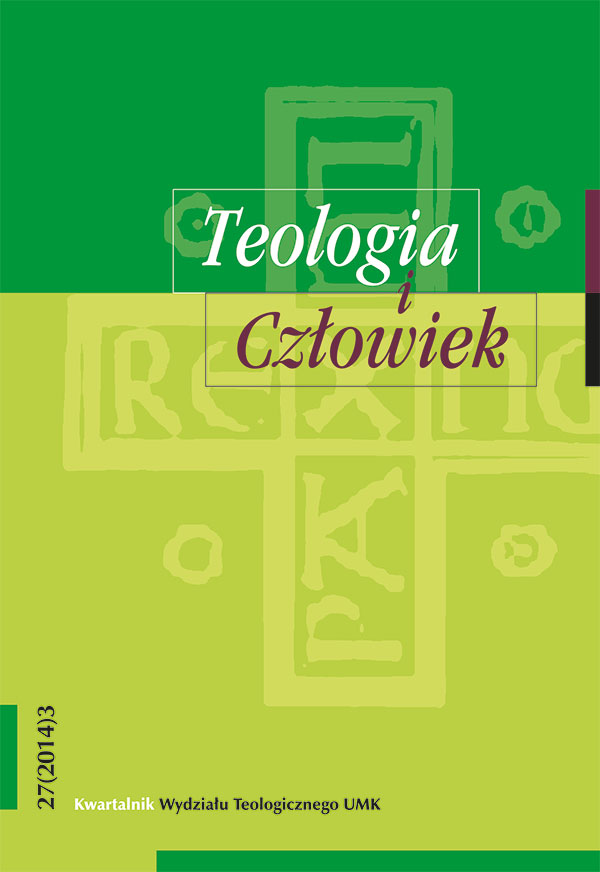Od natury do kultury. Dylematy i postulaty
DOI:
https://doi.org/10.12775/TiCz.2014.036Słowa kluczowe
kultura, natura, wartości, personalizm, normy moralne, osoba ludzkaAbstrakt
Kultura jest całokształtem ludzkich zachowań, działań i ich wytworów. Ma również charakter historyczny, jest bowiem przekazywana z pokolenia na pokolenie. Potocznie postrzegana kultura, jako dziedzina twórczości artystycznej, stanowi jedynie pewien wycinek kultury ludzkiej. Oddziaływanie kultury – jak trafnie zauważył Jan Paweł II podczas przemówienia w siedzibie UNESCO – jest dwukierunkowe, gdyż tak jak człowiek tworzy kulturę, tak i ten, przebywając w określonej kulturze, czerpie z niej wzorce. Twórcza aktywność człowieka ma charakter osobowy, gdyż twórca kultury – w każdym jej rozumieniu – poprzez wytwory kultury nawiązuje dialog z innym człowiekiem. Wartość kultury zawsze wynika z osobowej godności człowieka stworzonego na obraz i podobieństwo Boga. To podobieństwo do Boga stanowi odniesienie dla samego siebie i do innych członków społeczeństwa i jest fundamentem dla ludzkich norm moralnych i egzystencjalnych. Ich odrzucenie, odrzucenie Boga, prowadzi do sytuacji, że człowiek przestaje odróżniać dobro od zła, a normą staje się to, co dla niego w danym momencie wygodne. Na rozwój kultury, zwłaszcza w zakresie ukazywania wartości, znacząco oddziałuje religia. Wartości wpływają bowiem na charakter życia jednostek i całych społeczeństw. We współczesnym świecie powrót do klasycznego pojęcia kultury, rozumianej jako uprawa umysłu – by ten wzrastał w cnotach i pozbywał się wad – może stanowić antidotum na egzystencjalne i moralne osamotnienie człowieka. W tej perspektywie nauka staje się kulturą pojmowaną jako uprawa rozumu, zdolnego do poznawania prawdy. Kulturę należy zatem zawsze postrzegać przez pryzmat nieustannej relacji człowieka (stworzenia) do Boga (Stwórcy).
Pobrania
Opublikowane
Jak cytować
Numer
Dział
Licencja
CC BY ND 4.0. Posiadaczem prawa autorskiego (Licencjodawcą) jest Autor, który na mocy umowy licencyjnej udziela nieodpłatnie prawa do eksploatacji dzieła na polach wskazanych w umowie.
- Licencjodawca udziela Licencjobiorcy licencji niewyłącznej na korzystanie z Utworu/przedmiotu prawa pokrewnego w następujących polach eksploatacji: a) utrwalanie Utworu/przedmiotu prawa pokrewnego; b) reprodukowanie (zwielokrotnienie) Utworu/przedmiotu prawa pokrewnego drukiem i techniką cyfrową (e-book, audiobook); c) wprowadzania do obrotu egzemplarzy zwielokrotnionego Utworu/przedmiotu prawa pokrewnego; d) wprowadzenie Utworu/przedmiotu prawa pokrewnego do pamięci komputera; e) rozpowszechnianie utworu w wersji elektronicznej w formule open access na licencji Creative Commons (CC BY-ND 3.0) poprzez platformę cyfrową Wydawnictwa Naukowego UMK oraz repozytorium UMK.
- Korzystanie przez Licencjobiorcę z utrwalonego Utworu ww. polach nie jest ograniczone czasowo ilościowo i terytorialnie.
- Licencjodawca udziela Licencjobiorcy licencji do Utworu/przedmiotu prawa pokrewnego nieodpłatnie na czas nieokreślony
PEŁEN TEKST UMOWY LICENCYJNEJ >>
Statystyki
Liczba wyświetleń i pobrań: 572
Liczba cytowań: 0



